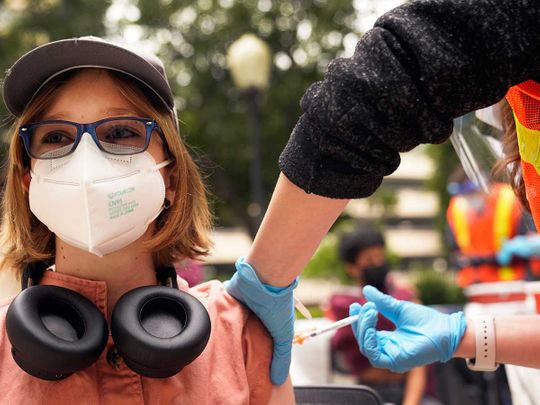
I came of age in the 1980s as a Reagan Republican distrustful of “big government.” In 2016, I left the Republican Party, but former president Donald Trump’s conduct only further heightened my suspicion of the government. Why should I trust Washington when the previous president abused his power so badly that he was twice impeached?
I am hardly alone in my scepticism. The Pew Research Center finds that the percentage of Americans who trust the federal government to do what is right has fallen from 73% during the Eisenhower administration to just 24% today.
US Transportation Secretary Pete Buttigieg is correct when he says: “I think a lot of the mistrust in our country right now is the result of policy failure.” Americans have seen decades of government mistakes — Watergate, Vietnam, 9/11, the wars in Iraq and Afghanistan, Hurricane Katrina, the 2008 crash, the 2020 pandemic and recession — accompanied by government failures to tackle deep-rooted, long-term problems like global warming, gun violence, racial injustice and income inequality.
Overweening power of government
The blowback from those fiascos has been exacerbated by the ever more extreme antigovernment ideology spread by Republicans. Trump even waged war on the civil service in the guise of fighting a mythical “deep state.” His abuses, in turn, made many liberals — normally the strongest statist constituency — wary of the overweening power of the federal government.
The COVID-19 pandemic shows where such distrust can lead — but also a possible path back.
Why does the United States have the most confirmed COVID-19 deaths — at least 596,000 — even though we have the most sophisticated medical system in the world? (Brazil and India may soon overtake us, if they haven’t already)
The answer is simple: Because so many Americans distrusted public health guidance to wear masks and engage in social distancing. Now, many people distrust public health guidance on vaccination, even though doing so will allow them to take off their masks and stop social distancing safely.
While 51.6% of Americans have already gotten at least one vaccine shot, 32% say they either don’t want to get a shot or are taking a wait-and-see attitude. Naturally, vaccination rates are highest in blue states such as Vermont and Massachusetts, where trust in government is high. The 19 states with the worst vaccination percentages all have Republican governors.
Achieving herd immunity
That vaccine hesitancy is making it hard to reach President Joe Biden’s goal of having 70% of the public at least partially vaccinated by Independence Day. That, in turn, makes it harder to achieve herd immunity and makes it more likely we will see future outbreaks of COVID-19 — including the worrisome possibility of variants that may evade existing vaccines.
This blinkered anti-vaccine prejudice — spread by the extreme left and extreme right — is deeply frustrating, because if anything should restore trust in government it is the rapid development and deployment of astonishingly effective vaccines. This is a bipartisan success story.
The creation of these sensational shots was the result of a federal-private sector partnership started by Trump: Operation Warp Speed. Their rapid dissemination is due to a federal-state partnership turbocharged by Biden. Only 16.5 million Americans had been partially or fully vaccinated when Biden took office. Now, 139 days later, it’s up to 171.3 million and counting.
I’m one of them — and so are all of my family members. Getting the shots wasn’t easy at first; it meant having to navigate multiple, confusing websites. But once we were able to make appointments, everything proceeded with impressive efficiency.
We received our Pfizer shots at the Jacob K. Javits Convention Center in Manhattan, where, at its peak, a combination of civilians and National Guard troops were vaccinating 10,000 people a day. By the time we arrived, the operation was running so smoothly that getting each shot took only an hour door-to-door.
Now we are able to return to our old lives — eating indoors at restaurants, attending dinner parties with friends, working out at the gym, even watching a movie inside an actual theatre. The same is true of our neighbours. New York City, a virtual ghost town at the height of the deadly pandemic, has sprang back to glorious life.
Thank you, Uncle Sam. This wouldn’t have happened without the much-maligned government. Indeed, the vaccination roll-out may be the most dramatic governmental success story of my lifetime. Its most obvious rivals — the moon landings, the Arabian Gulf War, and the end of the Cold War — occurred so long ago that no one under 30 will have personal memories of them.
The massive mobilisation to defeat COVID-19 has restored some of my faith in the government’s ability to solve problems.
I hope it will do the same for other Americans. Government isn’t always the solution, but it isn’t always the problem, either — and corrosive distrust of authority only handicaps our ability to tackle our toughest problems. Now the Biden administration needs to focus on getting more people around the world vaccinated to reverse the world’s loss of faith in the United States.
Max Boot is a senior fellow at the Council on Foreign Relations and the author of “The Road Not Taken: Edward Lansdale and the American Tragedy in Vietnam.”
Washington Post








